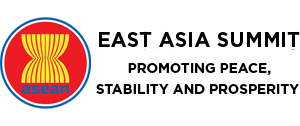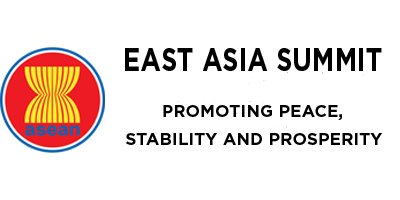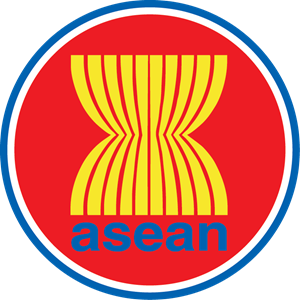Introduction
The East Asia Summit (EAS) process was initiated in 2005 with the convening of the 1st East Asia Summit in Kuala Lumpur, Malaysia. At its inception, the East Asia Summit comprised 16 participating countries, namely ASEAN Member States, Australia, China, India, Japan, New Zealand, and the Republic of Korea. The United States and Russian Federation joined at the 6th East Asia Summit in Bali, Indonesia on 19 November 2011.
The East Asia Summit refers to the Meeting of Heads of States/Governments of the EAS participating countries which is convened annually.
Objectives and Principles
The East Asia Summit’s objectives and principles are outlined in its basic documents, including the 2005 Kuala Lumpur Declaration on the East Asia Summit, the 2010 Ha Noi Declaration on the Commemoration of the Fifth Anniversary of the East Asia Summit, the 2011 Declaration of the 6th East Asia Summit on the Principles for Mutually Beneficial Relations, the 2015 Kuala Lumpur Declaration on the 10th Anniversary of the East Asia Summit, and the 2020 Ha Noi Declaration on the 15th Anniversary of the East Asia Summit. These documents reaffirm the nature of the EAS as a premier Leaders-led forum for dialogue and cooperation on broad strategic, political, and economic issues of common interest and concern with the aim of promoting peace, stability, and economic prosperity in East Asia.
The East Asia Summit has identified 16 streams of work, namely (1) Peace and Security; (2) Sustainable Development; (3) Climate, Environment and Energy Cooperation; (4) Education Cooperation; (5) Finance; (6) Health, including Pandemic Diseases; (7) Cooperation on Natural Disaster Management; (8) Cooperation on ASEAN Connectivity; (9) Economic Cooperation and Trade; (10) Poverty Alleviation; (11) Food Security; (12) Maritime Cooperation; (13) Strengthening EAS Institutional Capacity; (14) Tourism Cooperation; (15) Advancement and Empowerment of Women and Youth Participation; (16) Others as identified by Leaders and Ministers.
Annual Summits
| # | Date | Country | Host | Host leader | Note |
|---|---|---|---|---|---|
| 20th | 27 October 2025 | Malaysia |
Malaysia | Prime Minister Anwar Ibrahim | The President of BRICS and the President of G20 attended the Open Session, as guests of the Chair, and briefed the Meeting on their respective cooperation with the EAS to advance economic resilience and boost sustainable growth. |
| 19th | 11 October 2024 | Lao PDR |
Vientiane | Prime Minister Sonexay Siphandone | The President of the European Council and Secretary-General of the Shanghai Cooperation Organisation, as Guests of the Chair, briefed the 19th EAS on enhancing connectivity and economic integration. |
| 18th | 07 September 2023 | Indonesia |
Jakarta | President Joko Widodo | The Chairs of the Pacific Islands Forum and Indian Ocean Rim Association delivered remarks at the 18th EAS. Foreign Ministers of New Zealand and Russia, and Vice President of the U.S. headed their respective delegation. |
| 17th | 13 November 2022 | Cambodia |
Phnom Penh | Prime Minister Hun Sen | For the first time since the COVID-19 pandemic, the Summit was held in full physical format in Phnom Penh. The President of the European Council and Secretary General of the SCO delivered remarks on food and energy security. Foreign Minister of Russia and Vice President of India headed their respective delegation. |
| 16th | 27 October 2021 | Brunei Darussalam |
Videoconference | Sultan Hassanal Bolkiah | The Summit was hosted by Brunei Darussalam via videoconference due to the COVID-19 pandemic. The Director-General of the WHO and WTO briefed on the vital importance of multilateralism and solidarity to confront global health threats and to assure the sustainability of global economic recovery. |
| 15th | 14 November 2020 | Viet Nam |
Videoconference | Prime Minister Nguyễn Xuân Phúc | The Summit was held online due to the COVID-19 pandemic and hosted by Viet Nam, where the Summit was initially scheduled to take place. The Secretary-General of the United Nations and President of the World Bank Group briefed on global efforts in addressing COVID-19 pandemic and promoting comprehensive recovery. |
| 14th | 04 November 2019 | Thailand |
Bangkok | Prime Minister Prayut Chan-o-cha | The U.S. delegation was headed by the National Security Advisor on behalf of the U.S. President. |
| 13th | 15 November 2018 | Singapore |
Singapore | Prime Minister Lee Hsien Loong | U.S. Vice President attended the Summit on behalf of the U.S. President. |
| 12th | 14 November 2017 | Philippines |
Pasay | President Rodrigo Duterte | The Prime Minister of Canada attended as a guest. |
| 11th | 08 September 2016 | Lao PDR |
Vientiane | Prime Minister Thongloun Sisoulith | The Heads of State/Heads of Government of the Eighteen Countries participated in the Summit. |
| 10th | 22 November 2015 | Malaysia |
Kuala Lumpur | Prime Minister Najib Razak | The Heads of State/Heads of Government of the Eighteen Countries participated in the Summit. |
| 9th | 13 November 2014 | Myanmar |
Nay Pyi Taw | President Thein Sein | The Heads of State/Heads of Government of the Eighteen Countries participated in the Summit. |
| 8th | 10 October 2013 | Brunei Darussalam |
Bandar Seri Begawan | Sultan Hassanal Bolkiah | Russian President Vladimir Putin did not attend and was represented by Foreign Minister Sergei Lavrov. U.S. President Barack Obama did not attend due to the United States federal government shutdown of 2013 and was represented by Secretary of State John Kerry. The other members' leaders attended. |
| 7th | 20 November 2012 | Cambodia |
Phnom Penh | Prime Minister Hun Sen | The ongoing tensions arising from the territorial disputes in the South China Sea and East China Sea overshadowed the effort to advance the trade and economic arrangements between members of the Summit |
| 6th | 19 November 2011 | Indonesia |
Bali | President Susilo Bambang Yudhoyono | The United States and Russia joined the Summit. |
| 5th | 30 October 2010 | Viet Nam |
Ha Noi | President Nguyễn Minh Triết | The United States Secretary of State and the Foreign Minister of Russia attended. The United States and Russia were formally invited to join the Summit at the Sixth EAS. |
| 4th | 25 October 2009 | Thailand |
Cha-am & Hua Hin | Prime Minister Abhisit Vejjajiva | Thailand was initially to host the Summit. It was announced in late October 2008 that the Summit would be shifted from Bangkok to Chiang Mai due to concerns about political unrest in Bangkok. |
| 3rd | 21 November 2007 | Singapore |
Singapore | Prime Minister Lee Hsien Loong | Singapore Declaration on Climate Change, Energy and the Environment Agreed to establish Economic Research Institute for ASEAN and East Asia. |
| 2nd | 15 January 2007 | Philippines |
Cebu | President Gloria Macapagal Arroyo | Rescheduled from 13 December 2006. Cebu Declaration on East Asian Energy Security was adopted. |
| 1st | 14 December 2005 | Malaysia |
Kuala Lumpur | Prime Minister Abdullah Ahmad Badawi | President of Russia attended as a guest. |


